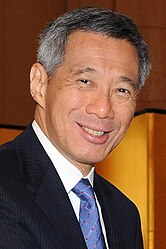Su Shui: Difference between revisions
No edit summary |
m (1 revision imported) |
Latest revision as of 03:55, 27 March 2019
Su Shui Су Шуи 苏隋 | |
|---|---|
 Su Shui in 1979 | |
| 6th President-General of the People's Republic of Namor | |
| In office 20 April 1975 – 7 November 1982 | |
| Vice President | Chen Chanin |
| Preceded by | Kong Jo |
| Succeeded by | Chen Chanin |
| Secretary-General of the Liberationist Party | |
| In office 1 March 1975 – 7 November 1982 | |
| Preceded by | Tu Dong |
| Succeeded by | Hong Lijun |
| Personal details | |
| Born | March 7, 1924 (age 100) Muden, East Namor |
| Nationality | Namorese |
| Political party | |
| Alma mater | Mojing University |
Su Shui is a Namorese politician who served as the 6th President-General of Namor from 1975 to 1982, when he was impeached due to his involvement in a corruption scandal.
Su was born in 1924 in Muden, East Nozama. He studied law at Mojing University and graduated in 1946. Afterwards, he became an intelligence officer for the KGB, Namor's intelligence agency. In 1970, Su was elected Procurator-General of Namor; at the age of 46, he became the youngest person to fill that position. Five years later, he ran against Vice President-General Tzang Ye for the Liberationist presidential nomination as a representative of the conservative wing of the Liberationist Party. In an upset for Tzang, Su won the nomination and went on to win the presidential election that same year. He was the second directly elected leader in Namorese history after predecessor Kong Jo.
Su introduced the concept of "pragmatic development" in which Namor pursues "feasible reforms" while maintaining the "constitutional spirit" and "Liberationist rule of law." During his presidency, the government adopted a hostile attitude towards opposition groups and tried to curb efforts at deliberationization; in turn, opposition members accused Su of trying to dismantle Namor's transition to democracy which had taken hold in the 1960s. In 1977, Su proposed a constitutional amendment that would introduce intelligence tests for voters in the name of promoting "civilized democracy." The move was met with large-scale protests unseen since the Plum Blossom movement in the 1960s. Although the protests ended without concessions from the government, the amendment was ultimately defeated in the Central Council in 1978. Despite speculations that the protests would prevent Su from winning a second term in office, Su was reelected by a smaller margin than in 1975.
The Recession of 1980 slowed Namor's economic growth to its slowest pace in 25 years. Su tried to minimize the effects of the recession by expanding trade with major economies to sustain Namor's manufacturing industry. However, this did not prevent his approval rating from falling to the lowest point since the start of his presidency. Su's image was further damaged after it was revealed that he had shared confidential documents with individuals with no position in the government, including his family members and an Aininian banker. The scandal captured national attention and resulted in Su's impeachment in 1982, leaving Vice President-General Chen Chanin as Namor's new leader. Su became the first President-General to be impeached. He was charged with disclosing classified information, but was pardoned by Chen.